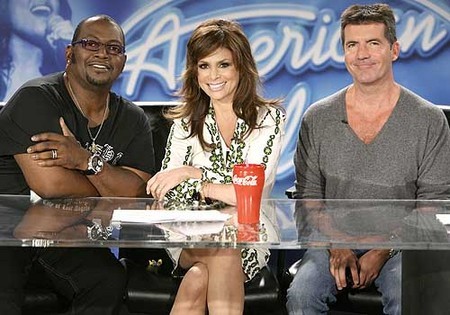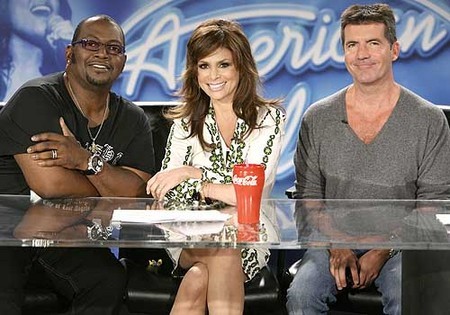Fox recently announced the upcoming cancellation of the popular singing competition American Idol, leaving many surprised TV viewers to remark "What? It's still showing?!" The decision came a few days before Idol crowned its latest winner Nick Fradiani who sang "Centuries" in the season finale as a fitting tribute to the competition and the hundreds of years that have passed since people have stopped caring about it. Fradiani is the latest addition to Idol's list of success stories that include big names such as white-haired-guy-after-Carrie-Underwood, season 13 winner Jack Black jr., and 2012 double-named champion: That Dude That Dude.
After several years, the contest is set to premier its final season in 2016, marking the long-awaited end to a show that has overstayed its welcome. In the interest of fairness, however, I would first like to give credit to Idol's initial success and the brilliance it possessed to be able to replicate and maintain it for how many years.
American Idol is the original singing competition; this will never change. The success enjoyed by similar talent competitions can be attributed to the concept and fan-base Idol has established. Though much of these shows have structures different from AI, their format was built on tweaking the original. The X factor, for example, was created by judge Simon Cowell whose AI fame -- or infamy -- greatly helped the newer program. His brutal honesty and scathing criticism has given both shows an authentic feel to them. Furthermore, Simon Fuller -- American Idol creator -- had actually filed a lawsuit against Cowell -- an action I'm sure a lot of traumatized AI contestants had mulled over. The legal complaint sprung from the alleged copyright-infringement of The X Factor, claiming that the show was a blatant rip-off of AI's format. The Voice expanded the judges role from critiquing to directly coaching the contestants but there's no denying its system is close to that of Idol's. AI paved the way for these programs to now capitalize on a market once exclusively dominated by the original singing contest.
Having a similar format, however, is a reflection of a show's lack of originality, not necessarily their overall quality. Many fans would readily concede that The X Factor or The Voice are copycats but attest to their superior execution. It's a classic case of "what you can do, I can do better" which, according to recent ratings, The Voice is actually doing. Though The X Factor U.S. was cancelled over a year ago, the various talent shows are proving to be competition to Idol.
Despite the influx of similar shows, however, AI has an edge in the number of successful artists it has produced. Kelly Clarkson, Carrie Underwood, Jennifer Hudson, Christ Daughtry all have their claim to fame. This article by Forbes lists down the top 10 Idol contestants based on the number of albums sold. Sadly, their popularity is short-lived with follow up albums doing poorly years after their initial hits. Which begs the question: has Idol really produced artists with sustained success?
The answer is more complicated than the question. AI has produced the likes of Kelly Clarkson and Carrie Underwood who have multiple Grammy's to their name. They have become household names over the years, while Fantasia Barrino is catching up as she quietly gathers her own collection of nominations. Hudson proved to be more than just a singer, winning an Oscar for her performance in Dream Girls. The rest, however, had cashed in on their 15 minutes only to fade out of the limelight. So yes, Idol has produced artists with sustained success but not enough of them to do justice to the show's goal of creating stars out of regular people.
The business of Idol is to serve these aspiring contestants. The show has failed in this regard for the past couple of years, leading many to wonder about the whole point of the contest. If it cannot produce long-lasting successful stars then maybe Idol is really only serving itself -- we all know how much cash it rakes in every season. AI is doing more to help out the careers of former superstars with the resurgent following they've gotten from the show's fan-base. And though one can argue that the contest can only go so far in lending a hand to these artists and the rest should be up to them, it leaves us to question the very effectiveness of the program. Maybe television talent shows are no longer viable avenues for that pursuit of fame and glory. There are better alternatives out there. YouTube, for example, is proving to be a great channel for aspiring stars to try their luck with Bieber and Carly Jae Repsen having started out there. The site offers the same number of viewers and an easier time -- after all it's much less difficult to perform in from of a WebCam than a live panel, unless Paula Abdul is there. She'll probably hold the camera for you while you sing.
Dipping ratings, failure to produce stars, these have contributed to the show's much needed cancellation. The ultimate reason, however, is far simpler. Idol has simply gone on for too long. Fifteen years is a lot of time; viewers get tired, ideas run out, the novelty and excitement over all of it simply fades. There is nothing wrong with reinventing things as AI had done, and shows who do so should be given due credit. There is a limit to all TV programs, however, even the good ones. Friends for example had maintained its success even in the latter seasons but they knew when to call it a day. Breaking Bad's Vince Gilligan made sure to keep the hit series short and...intensely depressing to keep it interesting. Perhaps Idol's biggest mistake is not acknowledging sooner the expiration date on their once brilliant show. 
Of course all this is irrelevant to the executive producers of FOX given that they've been making large sums of money regardless of the show's diminishing popularity. Therein lies another problem, profit maximization often takes paramount importance over anything else, including quality -- which includes delivering on the show's goal of producing stars. Producers milk every single cent they can out of a show before they decide to axe it and this turns things sour. Idol had long been a shadow of its former glory and yet its creators decided to keep it on for money's sake. I'm not going to go into the ethical implications of this -- the showbiz industry is still after all a business and profit is still once of its main goals -- but its negative impact on its overall quality is worth protesting about.
AI's cancellation is a welcome relief in the end. The show was running the risk of fading to oblivion -- or what Ryan Seacrest secretly refers to as pulling off a Brian Dunkleman. Some say it should have ended after the two Davids finale, some say it should have been axed after the Mariah Carey vs. Nicki Minaj fiasco, I personally think Simon Cowell's exit was a clear sign to pack things up, but almost everyone agrees on one thing: AI should've ended long ago.
Idol's failed promises have comeback with a vengeance. Much like its contestants, the show has exhausted its popularity and potential. The only tragedy is, while its aspiring stars had fifteen minutes, American Idol had fifteen years of fame.
